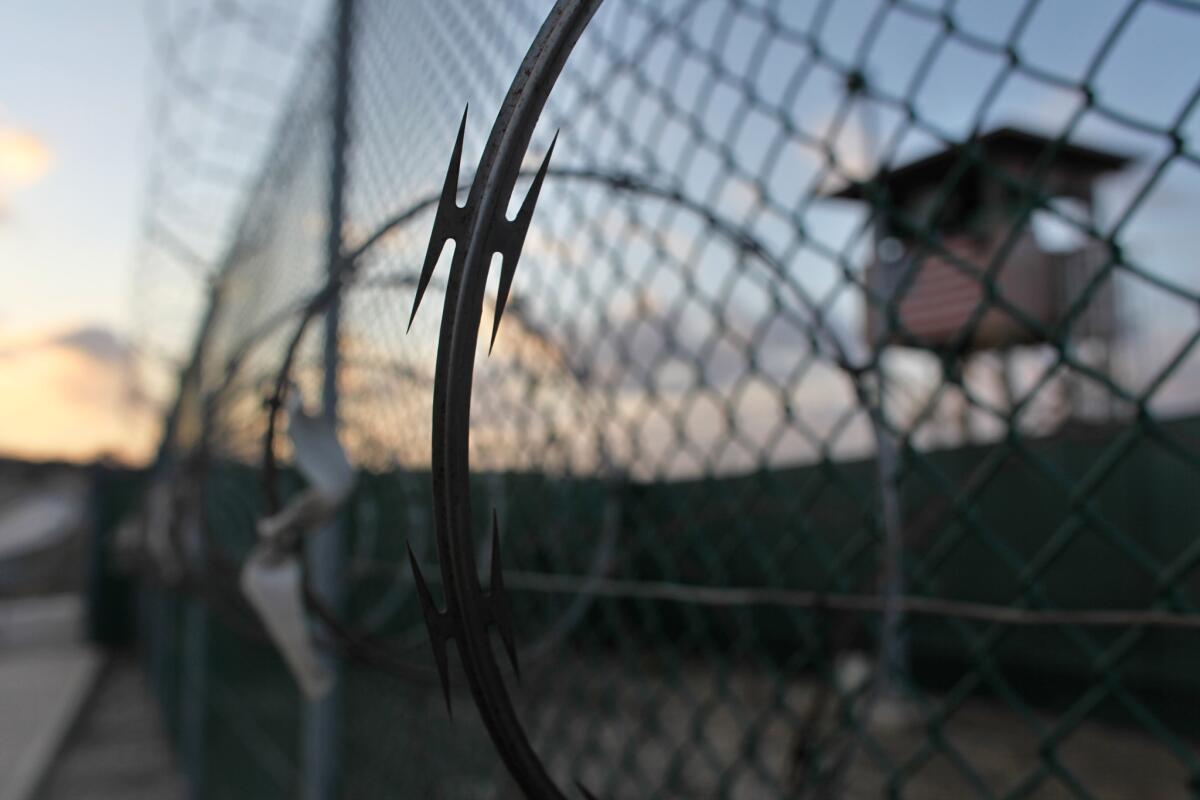Why Obama won’t be talking about Guantanamo during his Cuba visit

The U.S. military prison at Guantanamo Bay, Cuba.
- Share via
Reporting from Havana — Standing next to President Obama, Cuban President Raul Castro itemized remaining grievances with the U.S. that stood in the way of full normalization of relations. At the top of the list: the half-century-long U.S. trade embargo, and what he called the illegal occupation of Guantanamo Bay.
Both are subject to congressional action. But while Obama has spoken often of the former, stating emphatically Monday that “the embargo’s going to end,” the subject of the military detention facility has not been a focus of the president here, nor is it expected to be as he ends his historic three-day visit Tuesday.
That’s in part because of what Obama is focused on instead: pressing Cuba on its human rights record. Should he raise the issue of the Guantanamo prison in an effort to seek common ground, he gives Cuban leaders an opening to challenge U.S. moral authority on human rights, and risks undermining his own message that Cuba must reform.
By now, of course, the president had hoped the status of the detention facility would be settled. Obama has long seen the prison and treatment of its detainees as a symbol of the worst excesses of the George W. Bush administration’s war on terrorism. Closing it was one of his signature campaign promises, and one of his first executive actions after taking the oath of office in 2009 was meant to begin that process.
But it was only last month that the president sent a plan to Congress to permanently close it – one that left unanswered major questions like where some of its remaining detainees would be transferred. It listed 13 possible transfer sites without making a final recommendation.
See more of our top stories on Facebook >>
Obama has chosen to use his visit here to highlight the ways that new American engagement on the island, largely through commerce, would benefit the Cuban people. He visited a local private restaurant and is accompanied by executives looking to expand their business. One of Tuesday’s main events is a bit of baseball diplomacy, as the president attends a game between the Tampa Bay Rays and the Cuban national team.
Castro did urge the U.S. to give back Guantanamo in a private meeting Monday with Obama, according to deputy national security advisor Ben Rhodes.
“It’s normal for them to raise Guantanamo in just about every engagement we have with them,” Rhodes told reporters. “They believe that just our very presence in Guantanamo is a violation of their sovereignty, and that we should restore the facility to Cuban sovereignty.”
“We’ve made it very clear that’s not on the table,” Rhodes added.
Cuba has held firm, however.
“They’ve criticized publicly and to us privately their views of our detention practices at Guantanamo, so it’s a double issue that they raise,” Rhodes said.
NEWSLETTER: Get the day’s top headlines from Times Editor Davan Maharaj >>
“It’s awkward” that the U.S. is pressing Cuba on human rights while illegally detaining people on the same island, said Jose Pertierra, a Cuban American attorney in Washington who often advocates for the positions of the Cuban government.
“If you’re a Cuban leader and you see the president of the United States come and try to lecture you about human rights, you’re going to say, ‘Wait a minute. On our territory you’re detaining people who haven’t been tried, and there’s evidence you’ve been torturing them,’” said Pertierra, who represented the father of Elian Gonzalez, the young Cuban boy brought to Miami by his mother and then sent back to Cuba by the U.S. government, a custody battle that caused an outcry in both countries in 2000.
“What grounds does America have to come and lecture Cuba on human rights?” he said. “Cuba doesn’t belong to Washington.”
Obama is not afraid to have that debate, Rhodes insisted.
“It’s healthy for countries to surface their views on these things,” he said. “We think the Cuban government should take that same approach.”
What’s not up for debate is the U.S. territorial claim to Guantanamo Bay. When the U.S. ceded sovereignty of Cuba it had gained in the Spanish-American War, it held onto a 45-square-mile footprint at Guantanamo Bay. A 1903 treaty set the terms for the U.S. leasing a naval station there, and it was renewed in 1934, according to the U.S. Navy.
Now America’s oldest overseas naval base, Guantanamo has been a hub for U.S. humanitarian relief, including processing and housing refugees after a 1991 coup in Haiti, and providing relief after the country’s 2010 earthquake.
Rhodes said Obama’s focus right now is on closing the prison, but said that the land on which the prison sits has other uses that make Americans unlikely to give it back any time soon.
“The overwhelming focus has been on closing the prison,” Rhodes said. “In the past, Guantanamo has served a purpose, in terms of humanitarian responses, certainly migration responses, so that would be the view of what the facility is used for.”
Follow @katelinthicum and @mikememoli for more news on Obama’s visit to Cuba.
ALSO
Carnival will be first in 50 years to sail cruise ship from U.S. to Cuba
If all restrictions were lifted, flights to Cuba could drop 50% in price, study says
Obama appeals directly to Castro on democracy but pledges to let Cubans direct their own destiny
More to Read
Sign up for Essential California
The most important California stories and recommendations in your inbox every morning.
You may occasionally receive promotional content from the Los Angeles Times.












